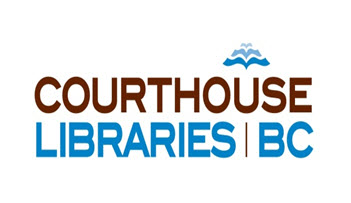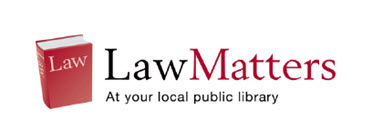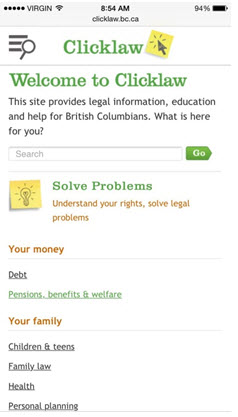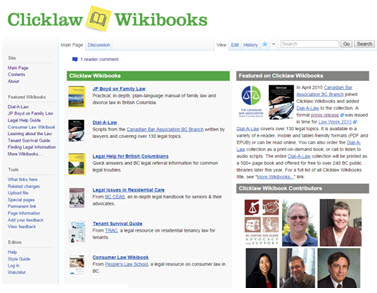What if everyone in B.C. had the legal information they needed and the ability to use it effectively? That’s the vision of Courthouse Libraries BC (“CLBC”) and it works with impressive expertise and creativity to achieve it.
 |
CLBC is a non-profit organization serving the public and the legal community through a blend of the human touch, physical space and technology. It provides innovative legal information services; it maintains a collection of print and digital materials; and its law librarians offer accredited training and outreach programs. |
What does this mean for you? You can get help from a librarian in CLBC’s 29 physical locations in courthouses around the province. All branches have public computers with access to internet, legal databases, and productivity tools. Everyone is welcome during hours when the locations are staffed by librarians (check locations for hours) and lawyers have after-hours access to all locations with their Law Society of BC membership cards.
| Can’t make it to your local courthouse library? Try your local public library. CLBC’s BC LawMatters program works with every public library in BC to help them develop and maintain a collection of legal resources for the public. |
 |
 |
CLBC also manages Clicklaw, an amazing mobile-friendly online portal where you can access legal information provided by trusted contributor organizations in British Columbia about every-day problems, resources and services. Clicklaw’s excellence was recognized when its coordinator, Audrey Jun, was awarded this year’s scholarship to attend CTC 2015, the largest court technology conference in the world and to present on Clicklaw to an international audience. Examples of links to resources you can find on Clicklaw include: wills, probate, going on welfare, disability benefits, personal planning documents, preparing for civil, family and criminal trials. And there’s much, much more. |
Contributors to Clicklaw are responsible for:
- managing their own resources by adding and editing information directly on Clicklaw - this ensures that new and current legal information is made available to the public promptly;
- sharing information about new resources and services through the Clicklaw Blog, a news hub; and
- making suggestions for additions to commonly-asked questions on the website.
Clicklaw’s Common Questions are a very popular feature. They direct you to good starting places for your legal matter or question. Clicklaw also features a HelpMap that allows you to search for free or low-cost services provided by phone or in-person, based on area of law and/or your location. An example of a HelpMap listing is for Family Justice Centres in BC, maintained by the Ministry of Justice, Justice Services Branch.
 |
Clicklaw’s companion site, the Clicklaw Wikibooks, , provides plain language legal information. It is a platform for lawyers and legal organizations to publish and update legal information in a range of digital and physical formats by editing a single source. In addition to getting them online, you can find several of the Wikibooks in print at your local public library. |
Clicklaw Wikibooks runs on the same open-source software that powers Wikipedia. Like Clicklaw, but unlike Wikipedia, CLBC's Clicklaw Wikibooks team screens contributors before they are given editorial privileges. This allows qualified and approved lawyers and other legal professionals to contribute content to the same Wikibooks title, ensuring that it is a collaborative process. This helps Clicklaw Wikibooks Contributors update and maintain the material without placing too heavy a burden on any particular individual or organization. Read more about the Wikibook Model of Public Legal Education here.
For legal professionals, CLBC offers online services including:
- training sessions for continuing professional development,
- downloadable study kits for lawyers,
- guides to legislation,
- a “Reading Room” where both lawyers and articled students training to be lawyers can access e-books, journals, case reporters and more (for example, Irwin Law eLibrary, HeinOnline) from their home or office, and
- Courthouse Library card holders can even order books by mail at no extra cost through the “Book in a Box” service.
CLBC also offers support services to public librarians and organizations that help people with legal problems.
British Columbians are fortunate to have the services CLBC offers – from a librarian available at your local courthouse to help with legal research (during specified hours) to the vast wealth of information at your fingertips in Clicklaw. Pay a visit to your courthouse library, your local public library, or go online and check them out - Courthouse Libraries BC and Clicklaw, or subscribe to the Clicklaw blog.

